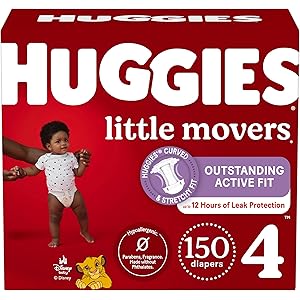Huggies Size 4 Diapers, Little Movers Baby Diapers, Size 4 (22-37 lbs), 150 Count (6 Packs of 25), Packaging May Vary
$52.99 (as of October 13, 2025 17:48 GMT +00:00 - More infoProduct prices and availability are accurate as of the date/time indicated and are subject to change. Any price and availability information displayed on [relevant Amazon Site(s), as applicable] at the time of purchase will apply to the purchase of this product.)Understanding Pregnancy Hair Loss
Pregnancy hair loss is a common concern for many women during and after pregnancy. Hormonal changes, particularly fluctuations in estrogen and progesterone, can significantly impact hair growth cycles. While some women may experience thicker hair during pregnancy, others might notice increased shedding, especially in the postpartum phase. Understanding the causes and effects of pregnancy hair loss is essential for managing this condition effectively.
Causes of Pregnancy Hair Loss
The primary cause of pregnancy hair loss is hormonal imbalance. During pregnancy, elevated hormone levels can prolong the anagen phase of hair growth, leading to fuller hair. However, after childbirth, these hormone levels drop, triggering a shift in the hair growth cycle. This shift can result in telogen effluvium, a condition where a significant number of hair follicles enter the resting phase, leading to noticeable hair shedding.
When Does Pregnancy Hair Loss Occur?
Pregnancy hair loss can occur at various stages, but it is most commonly observed in the postpartum period. Typically, hair shedding begins around three months after delivery and can last for several months. Some women may notice this shedding as early as during the last trimester, but it is often more pronounced after childbirth when hormone levels stabilize.
Signs of Pregnancy Hair Loss
Identifying pregnancy hair loss can be straightforward. Women may notice increased hair fall when brushing or washing their hair, as well as thinning areas on the scalp. Additionally, some may observe changes in hair texture or volume. These signs can be distressing, but they are usually temporary and part of the body’s natural adjustment process.
Managing Pregnancy Hair Loss
Managing pregnancy hair loss involves a combination of proper hair care and nutritional support. Using gentle shampoos and conditioners can help minimize breakage. Additionally, incorporating a balanced diet rich in vitamins and minerals, particularly biotin, zinc, and iron, can support hair health. Staying hydrated and reducing stress through relaxation techniques can also contribute to healthier hair during this time.
When to Seek Professional Help
While pregnancy hair loss is often temporary, some women may experience excessive shedding or bald patches that warrant professional consultation. If hair loss persists beyond the first year postpartum or is accompanied by other symptoms, such as scalp irritation or changes in skin health, it is advisable to consult a dermatologist or healthcare provider for further evaluation and treatment options.
Natural Remedies for Pregnancy Hair Loss
Many women seek natural remedies to combat pregnancy hair loss. Essential oils, such as rosemary and lavender, are believed to promote hair growth when massaged into the scalp. Additionally, herbal supplements like saw palmetto and nettle may support hair health. However, it is crucial to consult a healthcare professional before trying any new remedies, especially during pregnancy or breastfeeding.
Impact of Stress on Hair Loss During Pregnancy
Stress can significantly impact hair health, particularly during pregnancy. Emotional and physical stressors can exacerbate hair loss, leading to increased shedding. Practicing stress-reduction techniques such as yoga, meditation, and deep-breathing exercises can help mitigate these effects and promote overall well-being, which in turn may benefit hair health.
Postpartum Hair Care Tips
After experiencing pregnancy hair loss, adopting a proper hair care routine is essential. Using a wide-toothed comb can help prevent breakage, while regular trims can eliminate split ends. Additionally, avoiding heat styling tools and harsh chemical treatments can protect fragile hair. Emphasizing a nourishing hair care regimen can aid in the recovery of hair density and health.
Understanding the Timeline of Recovery
The timeline for recovery from pregnancy hair loss varies among women. Typically, hair shedding peaks around four to six months postpartum and gradually improves over the following months. Most women will notice a return to their normal hair growth patterns within 12 to 18 months after giving birth. Patience and consistent care are key to navigating this transitional phase successfully.



